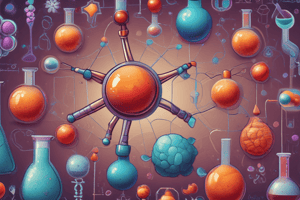Podcast
Questions and Answers
What are the building blocks of all matter?
What are the building blocks of all matter?
- Atoms (correct)
- Ions
- Elements
- Molecules
Which subatomic particles are found in an atom's nucleus?
Which subatomic particles are found in an atom's nucleus?
- Protons and ions
- Electrons
- Protons and neutrons (correct)
- Neutrons and electrons
What determines an atom's chemical properties?
What determines an atom's chemical properties?
- Number of neutrons
- Atomic mass
- Number of protons (correct)
- Number of electrons
What is a substance made up entirely of atoms of a single type called?
What is a substance made up entirely of atoms of a single type called?
What type of bond involves the sharing of electrons between atoms?
What type of bond involves the sharing of electrons between atoms?
What are formed when two or more atoms bond together to form a compound?
What are formed when two or more atoms bond together to form a compound?
What is the main cause of metallic bonds in metals?
What is the main cause of metallic bonds in metals?
Which law states that matter can neither be created nor destroyed in chemical reactions?
Which law states that matter can neither be created nor destroyed in chemical reactions?
What type of reaction involves combining hydrogen and oxygen to form water?
What type of reaction involves combining hydrogen and oxygen to form water?
In an acid-base reaction, what ions are formed in the case of bases?
In an acid-base reaction, what ions are formed in the case of bases?
What type of bond forms when a metal reacts with an acid to produce salt and hydrogen gas?
What type of bond forms when a metal reacts with an acid to produce salt and hydrogen gas?
Which theory classifies acids and bases based on the transfer of protons?
Which theory classifies acids and bases based on the transfer of protons?
Flashcards are hidden until you start studying
Study Notes
Exploring the Building Blocks of Chemistry
Chemistry is the study of matter and its transformations. At the heart of this discipline lie four fundamental concepts that form the foundation of our understanding: atoms, elements, molecules, chemical reactions, and acids and bases.
Atoms
Atoms are the tiny, indivisible building blocks of all matter. They are found in every substance, and they combine to form molecules. Atoms consist of a nucleus, containing a mix of protons and neutrons, and are surrounded by electrons that move in specific energy levels or shells.
An atom's chemical properties are determined by the number of protons in its nucleus, an integer called the atomic number. This number also corresponds to the atom's position in the periodic table, a chart of elements organized by atomic number.
Elements
Elements are substances that are made up entirely of atoms of a single type, each with a unique atomic number. They are the simplest form of matter and are divided into categories based on their properties, such as metals, non-metals, and metalloids. There are a total of 118 known elements, with many more predicted to exist.
Molecules
Molecules are formed when two or more atoms bond together to form a compound. These bonds can be covalent, ionic, or metallic. Covalent bonds involve the sharing of electrons, whereas ionic bonds involve the transfer of electrons to create ions. Metallic bonds, commonly found in metals, result from the delocalization of electrons throughout a lattice structure.
Chemical Reactions
Chemical reactions are processes that involve the transformation of one or more substances into one or more different substances. These reactions are governed by a set of rules, including the law of conservation of mass, which states that matter can neither be created nor destroyed, only transformed.
Reactions can be classified as synthesis (combination), decomposition, displacement, or exchange. Examples of these include combining hydrogen and oxygen to form water (synthesis), dissolving salt in water (decomposition), reacting metal with an acid to form a salt and hydrogen gas (displacement), and reacting hydrochloric acid with ammonia to form ammonium chloride (exchange).
Acids and Bases
Acids and bases are substances that can interact with water to produce ions, which in turn change the water's properties. A substance is considered an acid if it donates hydrogen ions (H⁺) to water, while it is considered a base if it accepts hydrogen ions (H⁺) from water. This interaction, known as the acid-base reaction, results in the formation of hydronium ions (H₃O⁺) in the case of acids and hydroxide ions (OH⁻) in the case of bases.
Acids and bases can be classified as strong or weak, and they follow a set of rules, including the Arrhenius definition, the Brønsted-Lowry theory, and the Lewis acid-base theory.
Understanding these fundamental concepts is the basis of learning chemistry and is critical to developing a strong foundation in the subject. By exploring these ideas, we can better understand the world around us and the chemical processes that govern it.
Studying That Suits You
Use AI to generate personalized quizzes and flashcards to suit your learning preferences.




